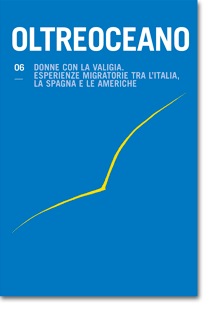Penelope è in Brasile. La scrittura in transito di Marina Colasanti
Keywords:
viaggio, donna, Colasanti, soggetti in movimentoAbstract
Lo studio si occupa della scrittrice italo-brasiliana Marina Colasanti, (nata in Eritrea, poi vissuta in Italia ed emigrata a Rio negli anni 50) e della tematica del viaggio, presente, con grande frequenza, nella sua scrittura, tanto nei titoli dei suoi testi, quanto nei contenuti. Il viaggio si accompagna, inoltre, a una riflessione sulla figura femminile, come un soggetto costantemente in transito.
Penelope is in Brazil. Marina Colasanti’s Writing in Transit
The essay focuses on Italian-Brasilian writer Marina Colasanti (born in Eritrea, raised in Italy, then migrated in Rio during the 1950s), and to the theme of the voyage – a consistent component of her writings. In addition, the dimension of voyage is strictly related to the figure of the woman, a subject constantly in transit.
Downloads
References
Andricaín, S. & Rodríguez, A. O. (2000): Marina Colasanti y las metáforas del inconsciente. Cuatrogatos. Revista electrónica de literatura infantil, 1. Recuperato da http://www.cuatrogatos. org/marina.html
Atwood, M. (2005): Il Canto di Penelope. Traduzione italiana a cura di Margherita Crepax. Milano: Rizzoli.
Atwood, M. (2011): La porta. Poesie. Traduzione e cura di Eleonora Rao. Firenze: Le Lettere.
Colasanti, M. (1979): Fio após fio. In M. Colasanti, Uma idéia toda azul (pp. 23-25). Rio de Janeiro: Nórdica.
Colasanti, M. (1979): Além do bastidor. In M. Colasanti, Uma idéia toda azul (pp. 7-9). Rio de Janeiro: Nórdica.
Colasanti, M. (1980): A nova mulher. Rio de Janeiro: Nórdica.
Colasanti, M. (1984): E por falar em amor. Rio de Janeiro: Salamandra.
Colasanti, M. (1997): Por que nos perguntam se existimos. In P. Sharpe (Ed.): Entre resistir e identificar-se: para uma teoria da prática da narrativa brasileira de autoria feminina (pp. 33-42). Florianópolis: Mulheres; Goiânia: EdUFG.
Colasanti, M. (1999): Como uma rainha de Micena. In M. Colasanti, Um espinho de marfim (pp. 9-10). Porto Alegre: L & PM.
Colasanti, M. (2001): A Moça Tecelã. In M. Colasanti, Doze Reis e a Moça no Labirinto do Vento (pp. 9-14). São Paulo: Global.
Colasanti, M. (2001): Penélope manda lembranças. In M. Colasanti, Penélope manda lembranças (pp. 7-25). São Paulo: Ática.
Colasanti, M. (2009): Passageira em trânsito. Rio de Janeiro: Record.
D’Angelo, B. (2011): Marina Colasanti, i colori del viaggio e del ricordo. In S. Serafin (Ed.), I colori dell’emigrazione nelle Americhe (pp. 117-126). Udine: Forum.
Fallaci, O. (2001): Penelope alla guerra. Milano: Bur Rizzoli.
Ippolito, E. (2005, 15 ottobre): Atwood e Penelope. D-Memory. La Repubblica, 471. Recuperato da http://d.repubblica.it/dmemory/2005/10/15/attualita/attualita/102gra471102.html
Mildonian, P. (2007): I viaggi di Penelope. In D. Ciani Forza (Ed.), Quale America? Soglie e culture di un Continente, II (pp. 323-329). Venezia: Mazzanti.
Miras, Domingo, P. (1995): Teatro mitológico. Ciudad Real: Biblioteca de Autores Manchegos.
Neri, R. A. (2002): O encontro entre a psicanálise e o feminino. Singularidade / Diferença. In J. Birman (Ed.), Feminilidades (p. 26). Rio de Janeiro: Contra Capa.
Sharpe, P. (Ed.), (1997): Entre resistir e identificar-se: para uma teoria da prática da narrativa brasileira de autoria feminina. Florianópolis: Mulheres; Goiânia: EdUFG.
Stegagno Picchio, L. (1997): Storia della letteratura brasiliana. Torino: Einaudi.
Villanueva, T. (2007): Prayer to Athena. So spoke Penelope. In D. Ciani Forza, Quale America? Soglie e culture di un continente, II (pp. 307-321). Venezia: Mazzanti.
Downloads
Published
How to Cite
Issue
Section
License

This work is licensed under a Creative Commons Attribution-NonCommercial-ShareAlike 4.0 International License.
The authors undertake to comply with the following conditions, which are considered accepted at the time of submission of their contributions.
The sending of a text implies that it is unpublished and not submitted to be published elsewhere.
1. If accepted, the author shall confer on the publisher the right to publish and distribute it both in paper form and in the online electronic edition. The published articles will be downloadable and made available in open access.
2. Provided that it correctly indicates that the first publication took place in the journal Oltreoceano. Rivista sulle migrazioni the author has the right to: a) reproduce the article in separate extracts or collected in a volume; b) publish the article on their personal website or teaching site provided that these sites are of a non-commercial nature; c) deposit the article in online archives of a non-commercial nature, linked to the institution they belong to or as part of projects for the non-commercial dissemination and open access of scientific works.
The use of contributions by third parties, for commercial or otherwise unauthorized purposes, is not allowed. The publisher declines all responsibility for the unauthorized use of the material published in the journal.












